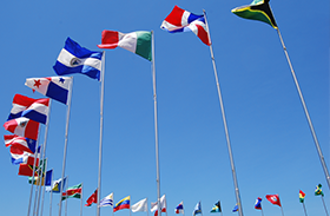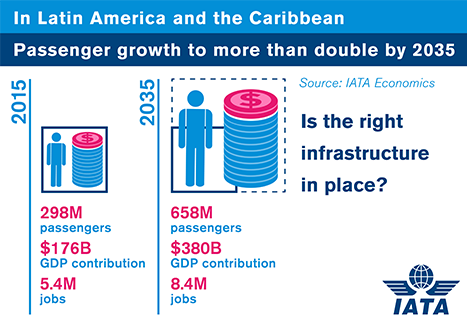
Passenger Numbers to Double by 2035
Translation: Spanish (pdf)
Mexico City - The International Air Transport Association (IATA) urged governments in Latin America and the Caribbean to work with industry to make infrastructure a priority in unlocking aviation’s economic and social benefits.
Deficiencies in the air and on the ground
- Capacity growth in line with demand: Severe capacity constraints in Bogotá, Lima and Mexico City illustrate the region’s airport capacity crunch. While plans are in place to address these, relief is years away at best. In the meantime, there will be lost opportunities for jobs and economic growth. Bogotá illustrates the importance of consultation with airlines to ensure that solutions match market demand and industry needs without being over-built. And Argentina, which ranks 114 among 141 countries for the quality of its air transport infrastructure (1), needs an urgent overhaul of its antiquated and costly air navigation system.
“The key is consultation. Airlines, governments and airport operators need to be partners in building successful cost-efficient infrastructure in line with market realities on cost and capacity,” said de Juniac.
- Infrastructure privatization: De Juniac sounded a cautionary note on airport privatization. “Harnessing the efficiencies of private enterprise to improve infrastructure needs iron-clad regulation to protect the users from out-of-control monopolies,” said de Juniac. He also urged governments to award infrastructure concessions with a priority on finding partners aligned with the long-term national interest of realizing the benefits of growing connectivity—not the short-term gain of those coming with the highest bid.
Chile, while in most aspects a model for forward-thinking governments on building a competitive air transport industry, is an example of what can happen when regulation is not strong enough. “Pre-funding airport expansion plans at Santiago’s airport has seen airport charges skyrocket, putting at risk the country’s air transport competitiveness and the social and economic benefits it generates,” said de Juniac.
- IATA (International Air Transport Association) represents nearly 265 airlines comprising 83% of global air traffic.
- You can follow us at http://twitter.com/iata2press for news specially catered for the media.

